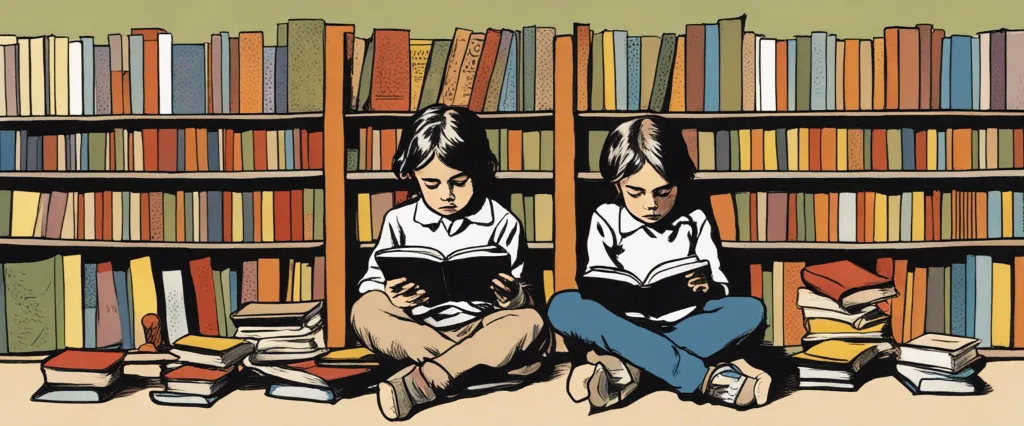——Children of the Self Absorbed by Nina W. Brown & The Drama of the Gifted Child by Alice Miller

Within the vast realm of psychology, numerous theories and research studies have shed light on the intricate dynamics of parenting and its impact on children’s development. Two noteworthy works that have stood the test of time are “Children of the Self Absorbed” by Nina W. Brown and “The Drama of the Gifted Child” by Alice Miller. Both books delve into the profound influence of parental behaviors on children, exploring the consequences of narcissistic parenting, while also examining the unique struggles faced by gifted children while growing up.
In Children of the Self Absorbed, Nina W. Brown meticulously analyzes the psychological ramifications of parents who exhibit narcissistic tendencies and the subsequent challenges their children face throughout their lives. Brown’s work meticulously outlines the various types of narcissistic parents, the impacts of their behavior on their children’s emotional and psychological well-being, and the long-lasting effects of this upbringing on adult relationships and self-perception. Drawing from clinical observations and research, Brown presents compelling case studies that vividly illustrate the subtle yet destructive nature of self-absorbed parenting.
On the other hand, Alice Miller’s seminal work, “The Drama of the Gifted Child,” explores the intricate dynamics experienced by children who exhibit extraordinary intellectual, artistic, or creative abilities. Miller examines the societal and familial pressures that gifted children often face, which can lead to emotional struggles and a unique form of trauma widely known as the “gifted child syndrome.” By interweaving her own professional experiences as a psychotherapist with vivid case studies, Miller provides readers with profound insights into the internal turmoil gifted children face and the profound impact that early childhood experiences have on their adult lives.
Although both texts revolve around the effects of parenting, they approach the subject matter from distinct perspectives. Brown’s “Children of the Self Absorbed” primarily focuses on the detrimental repercussions experienced by children of narcissistic parents, unveiling the intricate dynamics behind their upbringing. In contrast, Miller’s “The Drama of the Gifted Child” delves into the unique struggles faced by gifted children, providing a comprehensive understanding of the intricacies involved in nurturing their potential while safeguarding their emotional well-being.
This comparative study aims to explore and critically analyze the commonalities and differences that emerge from these two seminal works. By juxtaposing Brown’s examination of narcissistic parenting with Miller’s exploration of the “gifted child syndrome,” we will gain a clearer understanding of the significant impact parental behaviors exert on children’s psychological development, emotional well-being, and long-term outcomes.
In the subsequent sections, we will delve into the central themes explored by each author, examining the manifestations of self-absorbed parenting and the challenges faced by gifted children. Additionally, we will examine the theoretical perspectives and methodologies employed by Brown and Miller, providing a comprehensive overview of their approaches to understanding the intricate dynamics between parents and children.
Through this comparative analysis, we hope to shed light on the critical importance of healthy, nurturing, and empathetic parenting approaches, irrespective of a child’s individual traits or parental circumstances. Understanding the ways in which parental behaviors shape the lives of children can equip individuals with valuable insights into their own experiences, while simultaneously fostering a compassionate and empowering environment for future generations.
Brief Summary of Two Books
Children of the Self Absorbed by Nina W. Brown
Children of the Self-Absorbed” by Nina W. Brown explores the impact of self-absorbed parents on their children’s emotional and psychological development. The book provides readers with a comprehensive understanding of narcissistic parenting and its far-reaching consequences. Brown explores different types of self-absorbed parents, such as the emotionally neglectful parent, the parent who needs constant attention, or the overly controlling parent. She emphasizes that these parents prioritize their own needs over their children’s, leading to a variety of negative outcomes, including low self-esteem, boundary issues, difficulties forming healthy relationships, and a tendency to replicate self-absorbed behaviors in adulthood. Through case studies, the author offers practical suggestions for individuals raised by self-absorbed parents, helping them heal, establish healthy boundaries, and develop resilience. “Children of the Self-Absorbed” is a valuable resource for those seeking to understand and overcome the long-lasting effects of narcissistic parenting.
The Drama of the Gifted Child by Alice Miller
The Drama of the Gifted Child” by Alice Miller explores the destructive impact of childhood trauma and the consequences of growing up in an environment that does not recognize or validate a child’s emotional needs. Miller argues that children who have been “gifted” with intelligence and sensitivity often suffer from emotional and psychological wounds as a result of their upbringing.
Miller identifies the core issue as the denial and suppression of the child’s true self, which leads to the development of a “false self” as a coping mechanism. This false self is created to please and meet the emotional needs of parents or caregivers, often at the expense of the child’s own authentic feelings and desires. As a result, these children grow up with a deep sense of shame, low self-esteem, and difficulties in establishing authentic and healthy relationships.
The book delves into the various ways in which parents and society contribute to the creation of this false self, including emotional neglect, physical abuse, and societal pressures to conform to societal expectations and norms. By examining case studies and drawing on her clinical experience, Miller highlights the long-term negative consequences of denying a child’s true emotions and needs.
Miller emphasizes the importance of acknowledging and processing these childhood wounds in order to heal and develop a more genuine sense of self. She provides guidance on how individuals can begin to reconnect with their suppressed emotions, break free from destructive patterns, and reclaim their authentic selves.
Overall, “The Drama of the Gifted Child” exposes the deep emotional wounds that gifted individuals often carry and encourages readers to reflect on their own childhood experiences and the impact it may have had on their emotional well-being.
Comparison between Two Books

Similarities in Parenting
Both books, “Children of the Self Absorbed” by Nina W. Brown and “The Drama of the Gifted Child” by Alice Miller, examine the impact of parenting on children’s well-being and development. Although the focus may differ slightly, they share several similarities in their portrayal of parenting.
1. Narcissism and self-absorption: Both books explore the effects of narcissistic and self-absorbed parenting styles on children. They highlight how parents who are excessively focused on their own needs and desires often neglect or dismiss their children’s emotional well-being. This can lead to feelings of invisibility, low self-esteem, and a lack of emotional support for the child.
2. Emotional unavailability: Both books emphasize the importance of emotional availability in parenting. They argue that children need empathetic and responsive caregivers who can validate their emotions. When parents are emotionally distant or unable to connect with their children on an emotional level, it can result in emotional neglect and difficulties in forming healthy relationships.
3. Trauma and its effects: Both authors discuss the impact of childhood trauma caused by harmful parenting practices. They assert that children who experience emotional, psychological, or physical abuse may develop maladaptive coping mechanisms and struggle with their emotional well-being in adulthood. Both books advocate for recognizing and addressing these unresolved traumas to foster healing and growth.
4. Parental projection: Both books explore the concept of parental projection, where parents project their own unfulfilled desires or expectations onto their children. This can result in unrealistic expectations, pressure to meet the parent’s needs or goals, and a lack of validation for the child’s own identity and aspirations. By examining this phenomenon, both books highlight the importance of allowing children to develop their own sense of self.
5. Cycle of dysfunction: Both books shed light on the intergenerational nature of dysfunctional parenting patterns. They discuss how parents who were raised in environments characterized by narcissism or emotional neglect often perpetuate similar behaviors with their own children. This creates a cycle of dysfunction that can be challenging to break, emphasizing the need for conscious parenting and self-reflection.
While the books may differ in some areas, such as their focus on gifted children (in Miller’s book) or specific techniques for managing narcissistic parents (in Brown’s book), they share common ground in their exploration of parenting dynamics and their impact on children’s emotional well-being. Both books emphasize the significance of empathetic, emotionally available, and non-narcissistic parenting practices for healthy child development.
Divergences in Parenting
Children of the Self Absorbed by Nina W. Brown and The Drama of the Gifted Child by Alice Miller both offer valuable insights into the effects of certain parenting styles on children. However, they differ in their approach and perspective towards parenting.
One major divergence between the two books lies in their exploration of the term “self-absorbed” and how it relates to parenting. In Children of the Self Absorbed, Brown focuses on parents who are excessively self-centered, narcissistic, or lacking empathy towards their children’s emotional needs. She delves into various dysfunctional patterns and provides strategies for adult children to heal and free themselves from the negative impacts of this parenting style.
On the other hand, The Drama of the Gifted Child by Alice Miller does not explicitly label parents as self-absorbed. Instead, Miller examines the concept of the “gifted child” or “chosen child,” who feels pressured to fulfill their parents’ unmet needs and expectations. Miller argues that parents who project their unfulfilled desires onto their children inadvertently cause emotional harm to them. This book primarily focuses on how these dynamics can hinder a child’s individuation and the long-term consequences of such parenting patterns.
Another key divergence lies in the therapeutic approaches suggested by these authors. In Children of the Self Absorbed, Brown provides a comprehensive guide for adult children to work through their past, heal their emotions, and establish healthier boundaries with their parents. She emphasizes the importance of self-care and personal growth to break the intergenerational cycle of self-absorbed parenting.
In contrast, The Drama of the Gifted Child focuses more on self-reflection and understanding one’s own childhood experiences. Miller encourages readers to explore their emotional baggage and uncover the truth behind their upbringing to achieve personal healing and recovery. Although she does not provide explicit strategies for dealing with parents, Miller guides readers towards embracing their own inner child and nurturing their emotional well-being.
Overall, while both books address dysfunctional parenting and its effects on children, Children of the Self Absorbed takes a more explicit approach in identifying self-absorbed parents and offers practical strategies for adult children to overcome their upbringing. Meanwhile, The Drama of the Gifted Child emphasizes self-reflection and inner healing, enabling readers to understand and heal themselves rather than directly confronting parental behavior.

Conclusion
Both “Children of the Self Absorbed” by Nina W. Brown and “The Drama of the Gifted Child” by Alice Miller are highly regarded books that offer valuable insights for personal growth and understanding. The choice between the two ultimately depends on your personal interests and needs.
“Children of the Self Absorbed” explores the impact of narcissistic parents on their children, providing guidance for individuals who grew up in such environments. This book offers practical advice for healing and developing healthy relationships. If you have experienced the effects of narcissistic parenting or are interested in understanding its consequences, this book may be more suitable for you.
On the other hand, “The Drama of the Gifted Child” focuses on the experience of highly sensitive and talented individuals, exploring the ways in which childhood experiences shape their emotional and psychological well-being. This book delves into the challenges faced by sensitive individuals and offers insights for healing and personal growth. If you resonate with the concept of giftedness or consider yourself highly sensitive, this book may be more relevant for you.
Ultimately, both books provide valuable perspectives and potential for personal growth. Considering your own experiences and interests will help you determine which book is more worthy of your attention.



